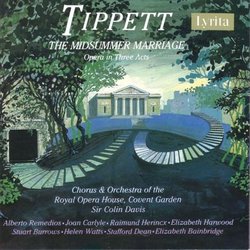A great recording of a joyous, rambunctious opera
Santa Fe Listener | Santa Fe, NM USA | 12/05/2007
(5 out of 5 stars)
"This splendid 1971 recording of Tippett's early, gorgeous masterpiece, The Midsummer Marriage, has to be considered against the fact that American listeners know nothing of the work and little more about the composer. At its premiere in 1955, ciritcs found Tippett's music difficult, which is strange, because it is tonal, richly tuneful, and bustling with rambunctious energy. They also deplored the libretto, written by the composer, which has been summarized as "a chaotic jumble of Western and Eastern mythology and symbolism, part Dr. Who, part The Magic Flute, part hippy-dippy flower-power philosophizing, part Jungian psychology, and part working class transfiguration."
To be simplistic, the libretto is basically the quirky admixture of a Shakespearean fairy world and a summer wedding party in modern England. Tippeet has no gift for creating characters, and he barely bothers, being more interested in a panoply of gorgeous sound, resounding fanfares, and general high spirits without regard for drama. The second half, indeed, is largely choral, which must prove difficult in production, given that the leading characters disappear into mass music=making.
The grand musical idiom, with its tendency toward public declamation, continues what Tippett began with his famous, epic wartime oratorio, A Child of Our Time. There are many arcane overtones in the plot -- Tippett was self-taught and had a grab bag mind -- but you can easily enter the opera through its constant melodiousness and splendiferous orchestration. The singers are all in top form, and Colin Davis conducts with conviciton and relish. I heartily enjoyed my first listen or a work I had long overlooked (the same can be said for Korngold's Die Tote Stadt, Pfitznr's Palestrina, Busoni's Doctor Faustus, and Einem's Dantons Tod, all on the fringe of the standard repertory but which contain many pleausres).
As a footnote, The Midsummer Marraige has received two major British productions at Covent Garden, each graced with a recording: the 1955 premiere under John Pritchard, now on Opera d"Oro in dreadful Mono radio sound, and a 1971 revival, which gave rise to this wonderful account reissued on Lyrita (it originally appeared on Philips)."


 Track Listings (19) - Disc #1
Track Listings (19) - Disc #1